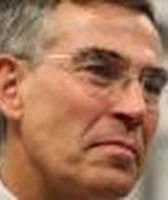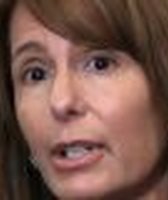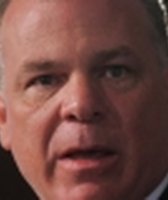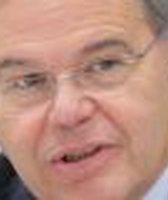Get PolitiFact in your inbox.
With federal officials divided over how to move forward on health care reform, U.S. Rep. Bill Pascrell appeared Jan. 25, 2010 on MSNBC’s "Hardball with Chris Matthews" to discuss ways to reach a resolution.
But more than two years later, his primary opponent, U.S. Rep. Steve Rothman, recently used a clip from that interview in an attack ad suggesting Pascrell admitted supporting "more tax cuts for the rich." The two Democrats are to compete on June 5 for their party’s nomination for a newly drawn congressional district.
After the narrator claims Pascrell supports such tax cuts, the video cuts to a three-second clip of Pascrell telling Matthews, "Republicans had great ideas. I liked some of their ideas." But Pascrell was talking about reaching a bipartisan deal on health care reform, not providing tax cuts.
Here’s the complete transcript of Pascrell’s nearly eight-minute "Hardball" interview:
Matthews: "Welcome back to Hardball. Here’s what...Democratic Congressman Bill Pascrell of New Jersey said about the Democratic approach to selling health care reform. Quote: ‘We are arrogant when we say, ‘Well, as soon as the public understands what we’re doing, they’ll like it.’ That is not only arrogant. It’s BS.’ U.S. Congressman Pascrell joins us right now. Sir, do you want to reiterate and perhaps (in) more illustrative language, perhaps prettier language, but you make your point. But do it again. What is it?"
Pascrell: "Well, the point of the matter is that we made it too cumbersome. We’re talking (about) many good ideas here, Chris. There’s no question about it. We cannot continue to do what we’re doing, whether we’re talking about what goes on in our hospitals or what goes on in health care in general. We can’t afford it first of all, and second of all, it’s not making us healthier. And I think that’s the main thing. So...we made too many things available in this particular piece of legislation and it confused and created more anxiety. The American people have enough anxiety right now, and we probably made it too large. I still believe in health care reform, but this isn’t the ticket. And, as my buddy from New York, Tony Weiner, said, ‘You’re whistling past a cemetery if you think we’re gonna resurrect the same tool.’"
Matthews: "Well, let me ask you about a simple question (no one) ever asks on this show. Let’s talk average people. I grew up in northeast Philly, north Philly for a while. I know what average people mean. You represent an average group of people up there in northern New Jersey--"
Pascrell: "Right."
Matthews: "What do average people who have a job, but are worried about losing it -- what do average people want from health care right now they don’t have or would they rather they had nothing?--"
Pascrell: "They want affordability--"
Matthews: "Would they rather the president just stayed away from it?"
Pascrell: "They want affordability, Chris, first of all, because those that have insurance see the premiums continue to rise. We have not guaranteed that those premiums really would be -- we’d cut them off and stop the increase. We haven’t really guaranteed that we’d minimize the increase in those premiums, because we weren’t able to take on the insurance companies. They still maintain...the exception, the exemption from the anti-trust laws. There’s only, as you know, two groups that do. Those and...the baseball players--"
Matthews: "Baseball--"
Pascrell: "And I, and I think that that’s not acceptable to the American people. And it only falls into what you’ve talked about many many times of how we perceive the big guys get away with things and the average guy doesn’t. And the average guy simply doesn’t want to get away with things, but he wants at least (to) not make it more difficult for him to...live day-to-day."
Matthews: "Well, nobody wants to be a chump and nobody wants to be working every day, coming home tired, barely able to watch television at night and wondering why they’re working so hard when it seems like somebody’s got some scam going, and and some of them are politicians. So, here’s the question: Are we better off with nothing than what’s on the table right now?"
Pascrell: "No, I don’t believe -- well...whether...."
Matthews: "That’s a tough call, isn’t it--"
Pascrell: "We’re talking about the Senate bill. We’re not gonna pass the Senate bill. That’s, that’s not gonna go any place in the House--"
Matthews: "So, we‘re better off with nothing than -- so, we‘re better off without that?"
Pascrell: "And the Senate bill, what I think we need to do is what the president suggested. Step back, take a breather. I would have done this back before Thanksgiving though, Chris. I think that’s when it was inevitable that we’re heading for a collision course, before Massachusetts. You know, just after New Jersey and Virginia--"
Matthews: "Yeah. Well, that’s looking backwards--
Pascrell: "The handwriting was -- was on the wall. And to be arrogant and not accept the dictates of those couple of...elections. It’s not the end of the world by any stretch. There are more Republicans retiring than Democrats. But again, if you indicate that you’re not affected by these elections, there’s something wrong in the process and we’re not responding to what the people’s feelings are."
Matthews: "How come there’s no deal-making? I like deal-making. Most people don’t like the smell of it, but I love it. It‘s construction, to be the smell of construction, when you‘re having deals made. Why can‘t you find 20 or 30 Republicans, like Reagan was able to find 30 or 40 Democrats, and cut a deal on health care? Aren‘t there enough Republicans out there that want to do something about pre-existing conditions--"
Pascrell: "Well--"
Matthews: "--About allowing people to take their insurance with them when they change jobs, the things that most middle-class people want? Why don‘t Republicans want those middle-class things, and why can‘t you do them together?"
Pascrell: "Well, there are some things that I think both sides would agree on. Of course, you know, preconditions, I mean, or--"
Matthews: "Well, why don‘t you do it?"
Pascrell: "--Or getting—or getting—well, I’ve suggested that we divide this into segments. We deal with the reforms first. We deal with the anti-trust second. And then we even deal with liabilities, Chris. There‘s no way to get around that problem. We’ve got to address it. We have got to come up with--"
Matthews: "I’m with you. I am with you...That is a great idea. Do the pre-existing, the reform stuff. Then do...this anti-trust stuff, so you have more competition."
Pascrell: "Right."
Matthews: "And then go deal with the trial lawyers later."
Pascrell: "That‘s what I would recommend--"
Matthews: "--First of all, the administration ain‘t going to touch the trial lawyers, because they‘re in bed with them. These Democrats—most Democrats, maybe not you, are in bed with the trial lawyers, the trial bench. They will not challenge them. They will not go after these—these deals, this amount of money you can make against doctors, and the fact we don‘t even have specialists in a lot of areas like Pennsylvania. Do you think they’ll actually (do) something you‘re proposing?"
Pascrell: "Yes. And I think that liability issues are blown out of proportion by both sides of the argument. There is no question in my mind we need to deal with it if we‘re gonna deal with health care reform. And, second of all, the trial lawyers aren‘t all wrong, because, in many of the states where they’ve had caps on these settlements, you know as well as I, there‘s been no freezing of the premium increase. Now, if you were to guarantee me that we’re gonna freeze premiums--"
Matthews: "That’s a good deal--"
Pascrell: "--I would absolutely go for--"
Matthews: "Well, let‘s make that deal--"
Pascrell: "--Liability reform right now, tomorrow morning."
Matthews: "There‘s a great deal. Get the insurance companies to cut premiums if you -- if you agree to put caps on these -- these deals, these findings by juries."
Pascrell: "Yes. Yes....part of the Texas reform, it has worked, but in no other state have they really frozen premiums--"
Matthews: "OK--"
Pascrell: "--In doing what you and I are talking about right now."
Matthews: "OK. Give us some hope. Is there going to be some kind of reform this year that‘s agreeable to both sides? Will they do this piecemeal and do something on portability, on pre-existing conditions? Let‘s start with that first chunk. Is it--is it gonna happen?"
Pascrell: "I really believe that it can happen. And I believe that the president should try again to reach out to the other side. I know he tried to do (it) in the beginning. Mr. Boehner, who’s the leader (of the) Republicans in the House, he chose the path of saying, ‘Nah, our party’s not gonna support any of this.' And it really puts the pressure on anybody on the other side who wants to think of some good (ideas). Republicans had great ideas. We had some bipartisan meetings...I liked some of their ideas, and they liked some of our ideas."
Matthews: "Make the Republicans vote against a reform like pre-existing conditions--"
Pascrell: "--That‘s correct. I’d like to see that. Expose--"
Matthews: "--That would be great. Number two, how about going with them on getting rid of the anti-trust, getting—letting—letting states, let guys, insurance companies compete across state lines, so you have real competition across--"
Pascrell: "Well, why don’t we make a deal between that and the liability situation? You can‘t have it all one way."
Matthews: "Yeah."
Pascrell: "Let‘s come up with language that we can both accept. I don‘t think that‘s so ridiculous."
Matthews: "Well, why are we having this conversation here, and they don‘t have it between -- between John Boehner and Nancy Pelosi?--"
Pascrell: "You’ll have to ask them--"
Matthews: "--Are they both locked into their interest groups, where they can‘t cut deals anymore, which is what politicians are supposed to do?--"
Pascrell: "--And that‘s part of the problem, because when the president started off talking to some of the entities that are involved here, I think he sent a message, because we were trying to get away from that kind of thing. You like the deal-making. I don‘t know if that‘s deal-making or simply casting a die on what‘s gonna happen in the future. There‘s a good side of it and there‘s a bad side of it...I don’t think good came out of that, by the way."
Matthews: "Well, if everybody who likes the idea of a compromise across the aisles, where you actually get something done, instead of more talk about it on programs like this--"
Pascrell: "I’m gonna fight for it, Chris--"
Matthews: "--Write U.S. Congressman Bill Pascrell -- P-A-S-C-R-E-L-L, P-A-S-C-R-E-L-L. That‘s United States House of Representatives, Washington, D.C., 20515. You can‘t miss it -- 20515. Actually writing a letter would be kind of old-school, but it would work. How about writing a letter to this congressman saying, let‘s get a compromise? Thank you, sir--"
Pascrell: "God bless--"
Matthews: "--And I appreciate you coming on Hardball tonight."
Pascrell: "Honored to be here, Chris."
Our Sources
Great Ideas, a video posted on YouTube by Congressman Steve Rothman’s campaign, May 8, 2012
Rep. Pascrell talks Health Care with Chris Matthews on MSNBC's Hardball, Jan. 25, 2010
Transcript of Hardball with Chris Matthews, Jan. 25, 2010













































